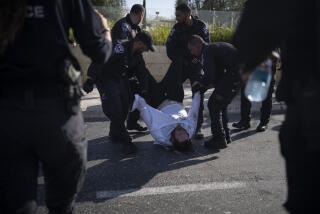Israeli Court Deals Blow to Security Agency
- Share via
JERUSALEM — Israel’s Supreme Court, in a landmark decision that could have a profound impact on this nation’s internal security apparatus, ruled Sunday that a Muslim army officer convicted of treason six years ago was innocent and that the evidence against him was fabricated.
In exonerating Izat Nafsu, a former army lieutenant and member of Israel’s Circassian Muslim minority, the high court issued what legal observers said was a de facto indictment of the Shin Bet, the highly secretive Israeli internal security organization whose questionable methods of interrogation have been a subject of controversy since another scandal last year.
More Appeals Possible
Legal observers predicted that legal action would be taken against the Shin Bet officers involved in Nafsu’s prosecution and said that the ruling--the first of its kind in Israel--could open the floodgates to appeals by many of the 4,000 Palestinian prisoners now in Israeli jails.
The overwhelming majority of these prisoners have been convicted largely on the basis of confessions extracted by the Shin Bet.
The high court ruling, handed down after 12 hours of deliberations, found that Shin Bet officers perjured themselves before the military tribunal that originally convicted Nafsu in 1981 and used “unethical interrogation methods” to force him to confess to crimes he did not commit.
The court ordered Nafsu, 32, released and referred the case to the attorney general’s office for possible prosecution of the Shin Bet officers involved.
At the courthouse, about 100 friends, relatives and other supporters from Nafsu’s hometown of Kfar Kama in northern Galilee broke into cheers and danced in the streets when the verdict was announced. Nafsu himself was hustled into a police van and whisked away to an undisclosed destination before his friends or reporters could approach him.
Prime Minister Yitzhak Shamir, who, citing the need for secrecy in security matters, has strongly opposed previous attempts to inquire into the interrogation methods of the Shin Bet, had no immediate comment on the verdict.
Investigation Demanded
But liberal politicians who supported the verdict were quick to demand an investigation of the Shin Bet, which figured in a similar scandal last year when one of its senior officers admitted to falsifying evidence during an inquiry into another incident in which Israeli agents beat to death two captured Palestinian bus hijackers in April, 1984.
The inquiry into that scandal was suppressed--the attorney general who sought to prosecute the Shin Bet officers in the case was dismissed--on grounds of national security.
This time, however, several politicians and legal experts predicted that the case would have to be investigated more thoroughly, both because of the lingering public resentment over the way the previous Shin Bet scandal was hushed up and because the victim in this case was not a Palestinian but an Israeli army officer, which is cause for more public outrage among Israelis.
“Anyone who is involved in the false conviction of an IDF (Israeli Defense Forces) officer should be prosecuted, and a national committee of inquiry should be appointed,” said Parliament member Mordecai Virshuvsky of the liberal Shinui Party.
While most of the details of Nafsu’s case remain shrouded in official secrecy, it has been learned that he was arrested in 1980 after having served with Israeli forces in southern Lebanon, where he was involved in liaison work between the Israeli army and its Lebanese Christian allies.
Recanted Confession
After two weeks of interrogation by the Shin Bet, he reportedly confessed to having passed military secrets to Syria--a confession he later recanted at a secret military trial, asserting it had been extracted illegally and under duress.
But a military appeals court rejected Nafsu’s claim to having been framed and upheld his conviction and sentence of 18 years imprisonment.
The case came to light only after the Knesset, Israel’s Parliament, passed a law allowing verdicts handed down by military courts to be appealed before the Supreme Court.
When it became clear that the new law might bring the Nafsu case into the open, thereby exposing the security service to public scrutiny again, Shin Bet officials sought to block the appeal.
While the high court refused to quietly dismiss the case, it did not completely exonerate Nafsu of all the charges against him.
It found him innocent of treason and espionage but ruled that he was guilty of overstepping his authority in Lebanon by having established contacts with what court sources described as a “senior” member of the Palestine Liberation Organization.
It sentenced him to two years imprisonment for that offense but deducted the sentence from the seven years he has already served in jail.
More to Read
Sign up for Essential California
The most important California stories and recommendations in your inbox every morning.
You may occasionally receive promotional content from the Los Angeles Times.










